May 13, 2025
5 min read
Struggle in choosing Apple Music vs Tidal?
This quick yet complete guide compares Tidal vs Apple Music across sound quality, pricing, features, and more—so you can pick the perfect music streaming platform for your lifestyle.
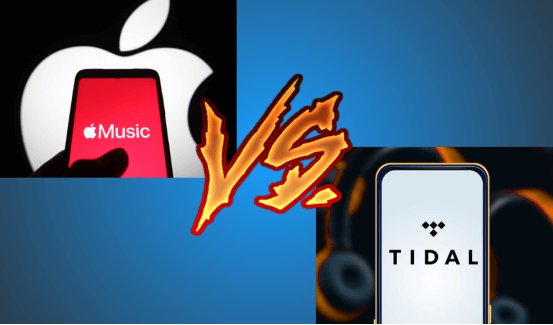

- 1. Sound Quality: Tidal vs Apple Music
- 2. Music Library and Exclusive Content
- 3. User Interface and Experience
- 4. Pricing and Subscription Plans
- 5. Device Compatibility and Integration
 Part 4:FAQs About Spotify vs Apple Music vs Tidal
Part 4:FAQs About Spotify vs Apple Music vs Tidal
Part 1: Brief Introduction of Apple Music and Tidal
In the music streaming world, Apple Music and Tidal stand out because they focus on quality and new ideas. Both offer a huge range of songs, playlists and other features, but their approaches differ, especially when it comes to sound quality and helping musicians.
Apple Music, which was launched in 2015, works well with other Apple products and has advanced features like Spatial Audio and Dolby Atmos. It is popular with most users and people who own Apple devices because it offers convenience and quality in one place.
Tidal was created by musicians for musicians. It was one of the first services to offer HiFi and Master Quality (MQA) streaming. It focuses on high-quality sound and pays artists well, which is why it is the preferred platform for those who care about ethics and sound detail.
So, which is better in 2025? Let’s break it down.
Part 2: Apple Music vs Tidal - Deep Comparison Across Key Features
Before diving deep into each feature, here's a quick snapshot comparing Apple Music and Tidal across key dimensions in 2025.
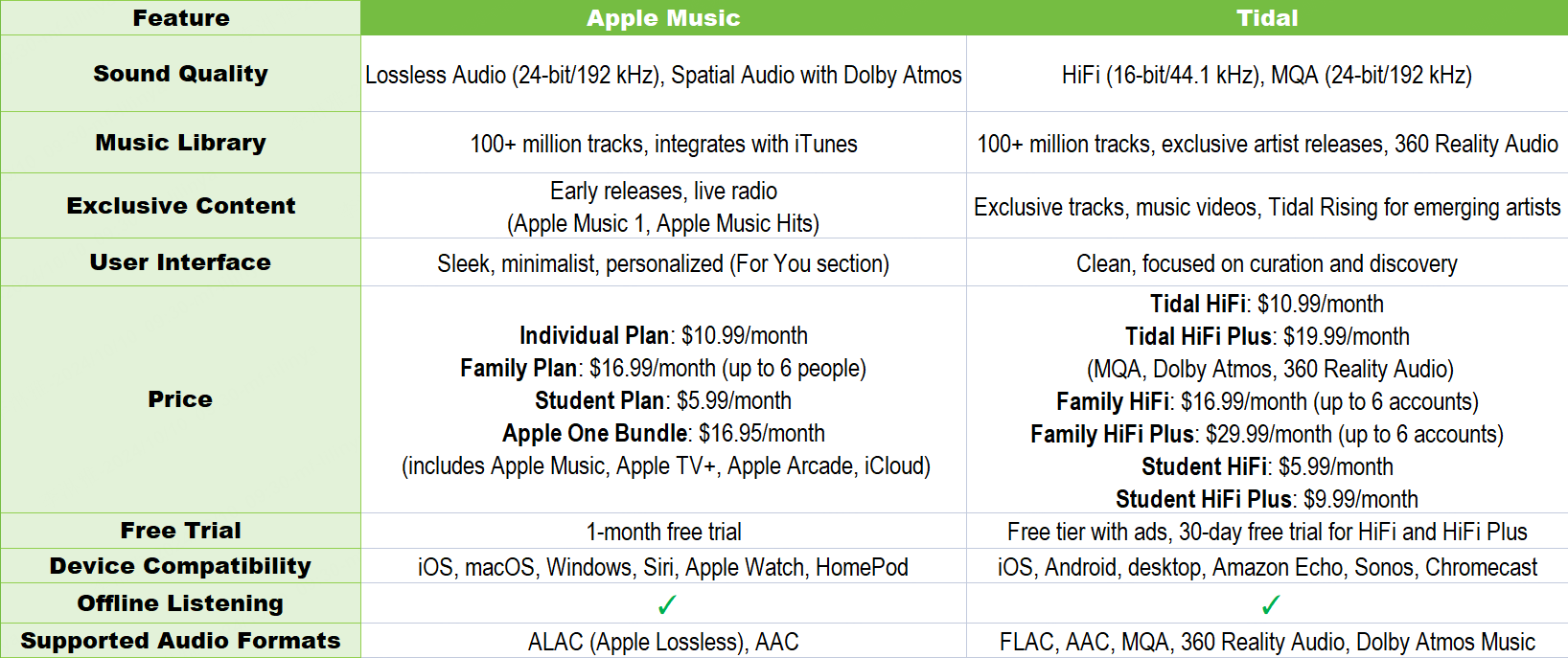
1. Sound Quality Comparison

Apple Music’s Audio Performance
Apple Music offers Lossless Audio and Spatial Audio with Dolby Atmos, providing an immersive listening experience. The maximum resolution reaches 24-bit/192 kHz, making it ideal for high-resolution audio enthusiasts.
Tidal’s HiFi and Master Quality
Tidal offers two audio tiers:
● HiFi (CD quality): FLAC format at 16-bit/44.1 kHz
● HiFi Plus: Includes Master Quality Authenticated (MQA) tracks, streaming up to 24-bit/192 kHz
It also supports 360 Reality Audio and Dolby Atmos for select albums.
Real-World Comparison
If you're a casual listener using regular earbuds, you probably won't notice a big difference. But for audiophiles with high-quality sound, Tidal's HiFi Plus tier is much better.
2. Music Library and Exclusive Content

Music Library
Both platforms boast over 100 million tracks, covering mainstream, indie, and international genres.
Exclusive Offerings
● Apple Music: Offers playlists created by celebrities, Apple Music 1 radio, and some exclusive releases, but less often than before.
● Tidal: It focuses on exclusive video content, live concerts, interviews, and early access to new releases. The platform also promotes new artists through the Tidal Rising programme.
3. User Interface and Experience

Apple Music
● Clean, minimal interface
● Seamless iOS/macOS integration
● Smart playlists and editor-picked content
Tidal
● Sleek dark mode by default
● Strong artist and album imagery
● Emphasis on liner notes and credits
● Emphasis on liner notes and credits
Both platforms show lyrics and music videos as you listen. Tidal also shows detailed information about the people involved in making the music, which is really good for fans and music professionals.
4. Pricing and Subscription Plans

Apple Music
Offers flexible plans, including Individual, Family, and Student options, along with Apple One bundles. It doesn't have a free tier but includes a 1-month free trial for new users.
Tidal
Provides HiFi and HiFi Plus tiers, with the latter offering MQA streaming. There's also a free, ad-supported version available, and discounts for families, students, and military personnel.
5. Device Compatibility and Integration

Apple Music
● Best experience on iPhone, iPad, Mac, Apple Watch
● Supports CarPlay and HomePod
● Limited integration on Android and Windows
Tidal
● Works on iOS, Android, Windows, macOS, smart TVs, Roon, and Hi-Fi devices
● Supports Tidal Connect, allowing lossless playback on certified equipment
In short, Apple users will love the smooth Apple Music integration. However, people with high-end audio equipment may prefer Tidal because it works better with their equipment.
Part 3: DIY Music Production: Tips to Create Your Own Music
Music streaming isn't just about listening—it's also about creating. If you've ever dreamed of making your own beats or creating a song without a full studio setup, you're in luck. Music production tools are easier to get than ever before.
One of the most beginner-friendly and innovative platforms is Musicful — an AI music generator that helps anyone create professional-quality music in minutes.
Just enter your lyrics and styles or descriptions of the song, you can easily get a full song! No music skills! Like you have a personal musician!
Professional music producers can also use it for inspiration.
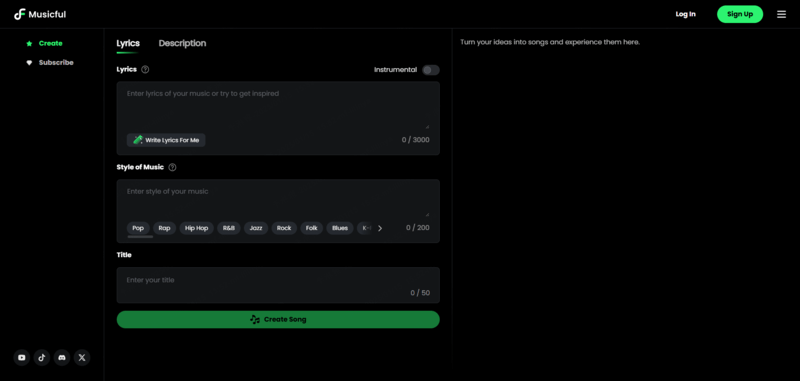
Key Features
⭐ Generate music with lyrics or description.
⭐ No music skills.
⭐ Supports all kinds of genres, like k-pop, metal, rap, etc.
How to Create Your Own Music?
Step1️⃣. Click on the green square below.
Step2️⃣. After log in, enter your genre or click "More" - "Genre" - "Folk", and add more on the Categories. Here I enter Celtic Folk,Energetic,Male Vocal. If you don't have lyrics, you can click "Write Lyrics for Me" let AI generare the lyrics, or choose "Description", enter your description about your song.
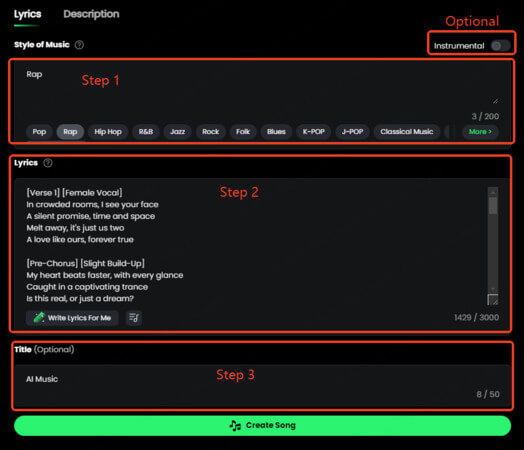
Step3️⃣. After clicking "Create Song", you can download the mp3 audio or the MIDI file for further creation. Or copy the link to share with your friends. Please enjoy this folk music I made.
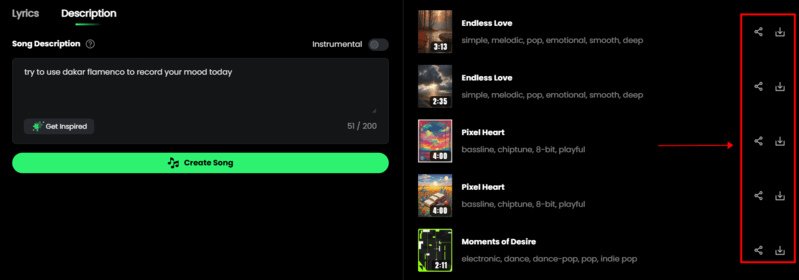
Part 4: FAQs About Spotify vs Apple Music vs Tidal
1. Is Tidal sound quality actually better?
Yes, Tidal is often regarded as having better sound quality compared to Apple Music, primarily because it offers HiFi and MQA (Master Quality Authenticated) options. Tidal's HiFi tier delivers lossless audio at 16-bit/44.1 kHz, while the MQA format can provide high-resolution audio up to 24-bit/192 kHz. This level of quality makes Tidal a preferred choice for audiophiles seeking the best possible listening experience.
2. Does Apple Music have the best sound quality?
Apple Music offers impressive sound quality with its Lossless Audio feature, which includes options for lossless streaming up to 24-bit/192 kHz. Additionally, Apple Music provides Spatial Audio with Dolby Atmos for an immersive listening experience. While it may not match Tidal's MQA offerings, Apple Music's sound quality is still excellent and suitable for most listeners, particularly those who enjoy the Apple ecosystem.
3. Is apple lossless the same as Tidal?
Apple Lossless Audio Codec (ALAC) and Tidal's lossless formats serve similar purposes but are not the same. ALAC is Apple's proprietary format for lossless audio, ensuring high-quality playback within the Apple ecosystem. On the other hand, Tidal uses FLAC (Free Lossless Audio Codec) for its lossless audio offerings. Both formats preserve the original quality of the music, but their compatibility and implementation may vary based on the platform and devices used.
4. Is TIDAL music better than Spotify?
Yes—TIDAL has better audio quality than Spotify, especially for audiophiles. TIDAL's HiFi and HiFi Plus packages offer FLAC and MQA streaming without any loss of quality, up to 24-bit/192 kHz, while Spotify's highest quality is 320 kbps using Ogg Vorbis files. If you care about sound quality, TIDAL is clearly the winner.
5. What is the #1 music streaming service?
As of 2025, Spotify is still the most popular music streaming service in the world, with the most users. This is because it is free, has powerful tools to help you find new music, and social features.
But other music streaming services like Apple Music and TIDAL are growing quickly. They offer better sound quality, special content, and better support for artists. The best choice depends on what you need. Spotify is great for reaching lots of people, but others may be better for performance and value.
6. Is Spotify or Apple Music better?
It depends on what matters most to you.
Spotify is great for finding new music, with clever playlists and a free version, so it's perfect for those who like to have a bit of a listen and share music on social media.
Apple Music, on the other hand, has better audio quality, works better with other Apple products, and offers content that's been chosen for you. So, it's perfect for people who use Apple products a lot or for people who really care about sound quality.
If you're an iPhone user or want better sound, go with Apple Music. If you like finding new music and want a free option, Spotify is the better choice.Conclusion
Apple Music vs Tidal isn't a simple choice.
If you're an Apple user and want high-quality audio that works well with your system, Apple Music is the best choice. But if you want the best sound quality, support for your favourite artists, and you have high-end audio equipment, Tidal HiFi Plus is the best choice.
No matter your preference, both services deliver a premium music experience with top-tier sound quality and features.
By the way, don't forget to create your own songs with Musicful and maybe one day you'll be the next musician with a lot of fans!


